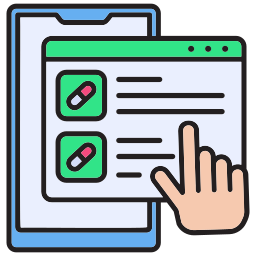In 2018, the World Health Assembly (WHA) passed resolution WHA71.7, establishing a global strategy for digital health from 2020 to 2025, focusing on a person-centric approach and interoperability as key principles for the functioning of digital health systems.
The current state of healthcare interoperability is a mix of progress and ongoing challenges. Many healthcare providers and institutions have implemented interoperable systems, enabling better data exchange and communication. However, inconsistencies in data standards and the varied adoption rates of these systems can still hinder seamless integration. Despite advancements, many healthcare environments struggle with fragmented data, leading to inefficiencies and gaps in patient care.
Evolving interoperable systems is crucial for the future of healthcare. As technology advances, the need for efficient data sharing and integration becomes even more critical. Future-focused interoperability will enable more accurate diagnostics, personalized treatments, and streamlined operations. Enhancing these systems will improve patient outcomes and ensure healthcare providers can adapt to emerging technologies and changing patient needs effectively. Let’s discuss the new trends in the future of interoperability.
Emerging Trends in Interoperability
Emerging trends in interoperability are transforming healthcare, promoting seamless data exchange, improving patient care, and fostering collaboration among providers through innovative technologies and standardized protocols.

Here are a few more emerging trends in interoperability:
🔮 Telemedicine and Remote Patient Monitoring
The rise of telemedicine and remote patient monitoring has underscored the need for seamless data exchange. These technologies enable patients to receive care remotely, requiring integrated systems to ensure that healthcare providers have access to up-to-date patient information for effective treatment.
🔮 Patient-Centered Health Records
Increased patient access to personal health records allows for greater involvement in healthcare decisions. Patients can share their data with multiple providers, ensuring continuity of care and improving the overall healthcare experience.
🔮 Standardized Data Exchange Protocols
The development and adoption of standardized data exchange protocols, such as FHIR, are crucial for ensuring consistent and accurate data sharing across different healthcare systems. This standardization simplifies integration processes and supports effective communication between diverse healthcare applications.
Learn More about Epic's FHIR Capabilities
🔮 Cloud-Based Health Solutions
The adoption of cloud-based health solutions allows for scalable and flexible data storage and sharing. Cloud platforms support interoperability by enabling real-time access to patient information from any location, thus facilitating coordinated care and collaboration among providers.
🔮 Interoperable Medical Devices
The development of interoperable medical devices that can communicate with each other and with EHR systems is improving patient monitoring and care management. These devices generate data that is seamlessly integrated into healthcare systems, providing comprehensive and real-time patient insights.
🔮 Government and Regulatory Support
Government initiatives and regulatory frameworks are playing a significant role in promoting interoperability. Policies and incentives are encouraging the adoption of interoperable systems, ensuring that healthcare providers adhere to standards that facilitate effective data exchange and improve patient outcomes.
🔮 Health Information Exchanges (HIEs)
HIEs are becoming more prevalent, providing a platform for the secure sharing of patient data across different healthcare organizations. HIEs enhance interoperability by enabling comprehensive access to patient records, thus improving care coordination and patient outcomes.
🔮 Mobile Health Applications
The rise of mobile health applications is enhancing patient engagement and data sharing. These apps allow patients to track their health metrics and share this information with their healthcare providers, facilitating better monitoring and management of health conditions. This trend supports greater interoperability by integrating patient-generated data into clinical workflows.
Future Benefits of Interoperability
✅ Enhanced Patient Outcomes
Interoperable systems enable healthcare providers to access complete and up-to-date patient information. Such simple access allows for more accurate diagnoses, timely interventions, and personalized treatment plans, ultimately improving patient health and experience.
✅ Increased Efficiency
Future interoperability reduces administrative burdens by automating data exchange and minimizing manual entry. This streamlined workflow lets healthcare professionals concentrate more on patient care, boosting overall productivity within healthcare facilities.
✅ Better Decision-Making
Access to comprehensive patient records and real-time data supports informed clinical decisions. Interoperable systems allow providers to track patient progress, identify health trends, and make evidence-based treatment choices, thus enhancing the quality of care.

✅ Reduced Medical Errors
Consistent and accurate data sharing across healthcare systems helps prevent medical errors. Providers can access essential information about a patient's medications, allergies, and medical history, reducing the risk of adverse events caused by incomplete or incorrect data.
✅ Cost Savings
By optimizing resource use and reducing unnecessary tests and procedures, interoperable systems contribute to significant cost savings. Efficient data sharing eliminates redundancies, streamlines operations, and lowers healthcare expenses.
✅ Improved Collaboration
Interoperability facilitates better communication and coordination among healthcare teams. When all members have access to the same information, they can collaborate more effectively, resulting in cohesive patient management and improved care outcomes.
✅ Compliance with Regulations
Interoperable systems simplify adherence to healthcare regulations and standards. Consistent data sharing ensures that providers meet compliance requirements, protect patient privacy, and maintain ethical standards, thereby avoiding legal and financial penalties.
In the next few years, wearable API integrations and EHR integrations are expected to revolutionize healthcare by enabling more comprehensive, real-time patient monitoring and data sharing. Wearable devices will increasingly integrate with EHR systems, providing continuous health data that enhances personalized care and early intervention. Trends like advanced AI analytics, improved interoperability standards, and secure cloud-based platforms will facilitate seamless data flow, improving clinical outcomes and operational efficiencies across the healthcare ecosystem.
Case Studies
Healthcare organizations that are pioneering interoperability often serve as models of how advanced systems can improve outcomes. For example, a leading hospital network integrated FHIR-based solutions to consolidate patient data from various sources. This move improves data accuracy and facilitates better coordination among different care teams, resulting in a marked improvement in patient care and reduced operational costs.
Another notable success story involves a regional health system that adopted an interoperable EHR to streamline data sharing between primary care providers and specialists. By doing so, they reduce duplicate tests and enhance the efficiency of care delivery. These cases demonstrate the tangible benefits of advanced interoperable systems, including improved patient outcomes and operational efficiencies.
How HealthConnect CoPilot Can Help You with the Future of Interoperability in Healthcare?
The future of interoperability in healthcare holds significant promise, with the potential to transform how data is exchanged and utilized across various systems. Interoperable solutions offer numerous benefits, including improved patient outcomes, increased efficiency, and better decision-making. These advantages are crucial as the healthcare sector evolves and becomes more complex.
As the industry moves forward, ongoing developments in technology and data integration will play a key role in shaping the future of healthcare. Healthcare providers, technology vendors, and policymakers need to focus on advancing interoperability initiatives.
HeathConnect CoPilot is well-positioned to assist organizations in building solutions that align with future interoperability goals, ensuring that they fully capitalize on these benefits and drive meaningful improvements in healthcare delivery.
- What is the future of interoperability in healthcare?
The future of interoperability in healthcare involves more advanced integration of systems and technologies that facilitate the seamless exchange and use of patient data across various platforms. This progress aims to improve patient care, enhance efficiency, and support better decision-making in the healthcare industry.
- How will interoperability benefit patient care?
Interoperability will significantly benefit patient care by providing healthcare providers with access to complete and up-to-date patient information. This access allows for more accurate diagnoses, timely interventions, and personalized treatment plans, leading to better health outcomes and improved patient satisfaction.
- What role do emerging technologies play in future interoperability?
Emerging technologies such as artificial intelligence, blockchain, and telemedicine are expected to play a crucial role in future interoperability. These technologies will drive advancements in data exchange, support real-time patient monitoring, and improve the overall management of health information.
- What are the main challenges to achieving future interoperability?
Key challenges to achieving future interoperability include the need for standardized data formats, the integration of disparate systems, and ensuring data security and privacy. Addressing these challenges requires coordinated efforts among healthcare providers, technology vendors, and policymakers.
- How can organizations prepare for future interoperability advancements?
Organizations can prepare for future interoperability by adopting standards like FHIR, investing in flexible and scalable technologies, and fostering collaboration among stakeholders. Staying updated with industry trends and participating in interoperability initiatives will also be crucial for successful integration.

Pravin Uttarwar, CTO of Mindbowser
As the CTO of Mindbowser, a healthcare-focused software development company, I am dedicated to delivering cutting-edge digital solutions that transform patient care and operational efficiency. With over 16 years of experience and as an MIT alumnus, I specialize in healthcare interoperability, FHIR-compliant systems, and AI-powered platforms, crafting scalable products and architectures tailored to the unique needs of healthcare providers and enterprises.
I have spearheaded the development of over 100 products and platforms, guiding them from concept to full-fledged solutions. My expertise extends to scaling remote tech teams, driving EHR integrations, and building secure, cloud-native healthcare solutions. By shaping technology visions and roadmaps, I help clients achieve long-term growth and success in the rapidly evolving healthcare landscape.
HealthConnect CoPilot enabled us to access real-time patient health data through integration with Apple HealthKit, enhancing care delivery while maintaining HIPAA compliance. This led to personalized care and improved outcomes for patients.

AI-enhanced Obstetrics Clinical Decision Support Platform
HealthConnect CoPilot's integration with Epic's Hyperspace has transformed our workflow. Automated post-delivery examinations and HL7 protocol use ensure accurate updates to Epic. Their expertise empowers informed decision-making in childbirth

Top Provider for Customized Healthcare Solutions
HealthConnect CoPilot's helped us to integrate with leading tracking devices such as Apple Watches and Fitbit. This integration enables effortless syncing of health data, providing users with real-time insights displayed directly on our flagship products: smart mirrors and digital calendars.

A Provider of Customizable Display Solutions
Post a comment Cancel reply
Related Posts
Healthcare Integration: The Understanding & Its Impact in Healthcare
Healthcare integration refers to connecting various systems, applications, and data sources within the healthcare ecosystem…
Value-based Care vs Fee-for-Service
Healthcare payment systems can feel a bit like deciding between paying for each item on…
Checklist for EHR Integration in the Healthcare System
EHR integration in the healthcare system refers to the seamless connection of EHR systems with…
Integrating FHIR and Genomics: How AI is Shaping the Future of Medicine
AI is transforming the way medicine approaches personalized healthcare, particularly through genomics. By analyzing vast…
The Road to Value-based Healthcare: How Interoperability Paves the Way
Interoperability in healthcare refers to the ability of different health information systems to exchange, interpret,…
EMR vs EHR: What’s the Difference?
EMR vs EHR is a decade-old topic that makes you wonder about how different they…










